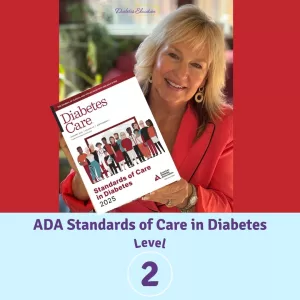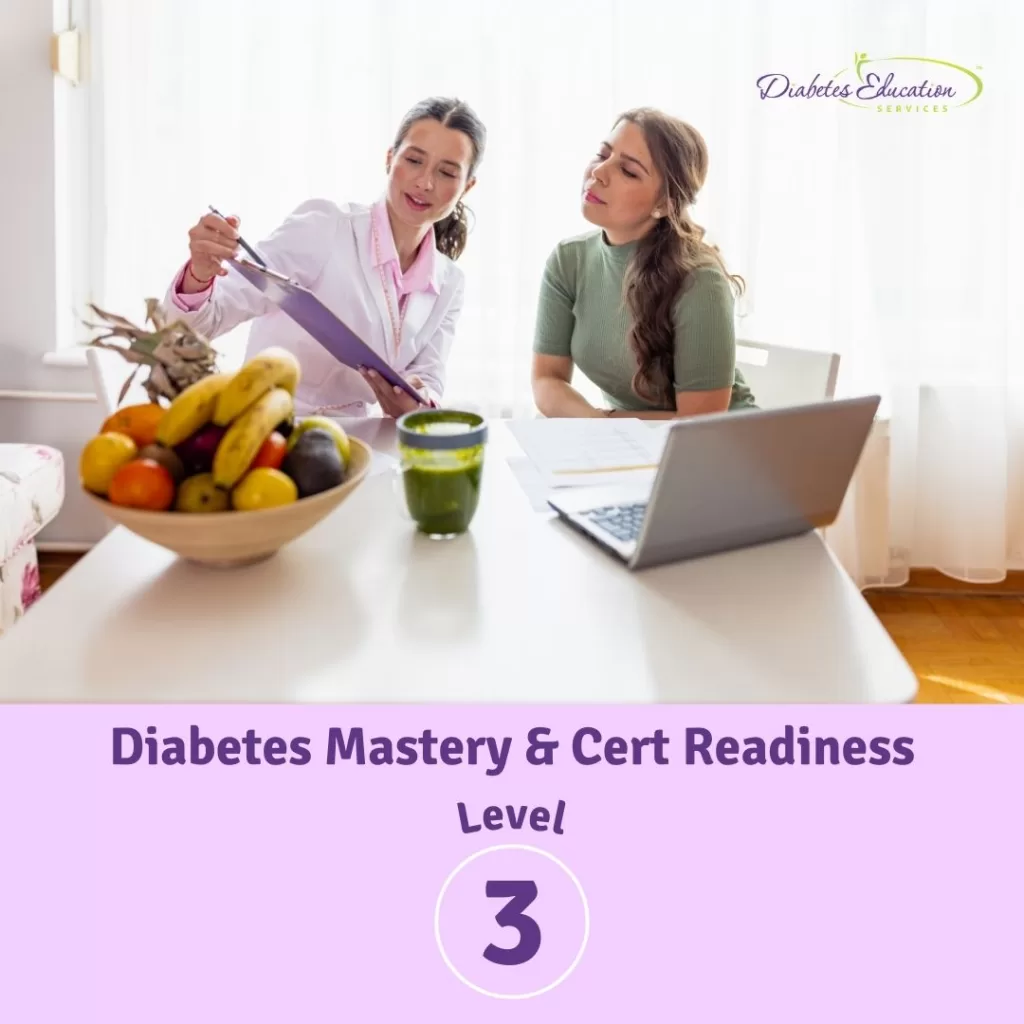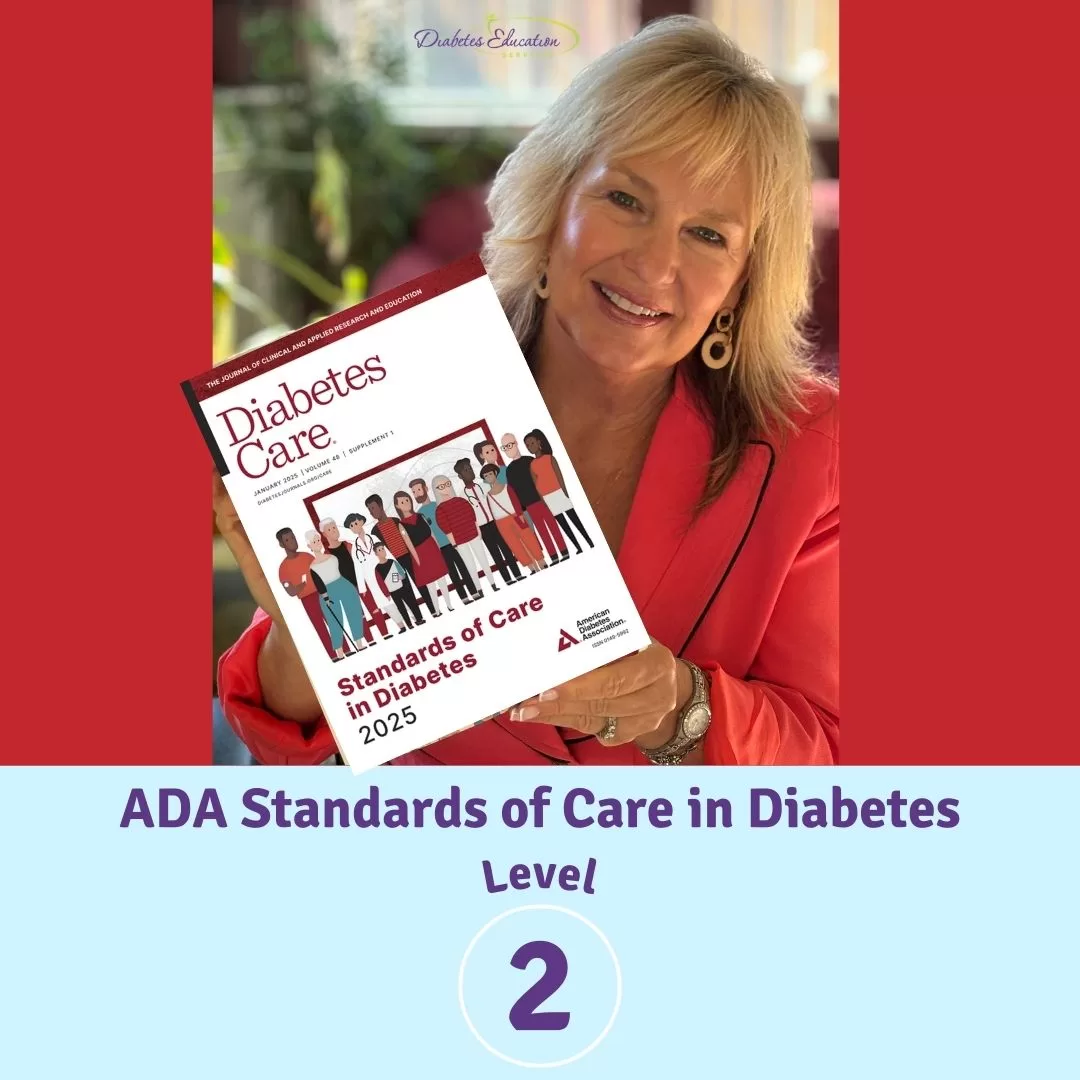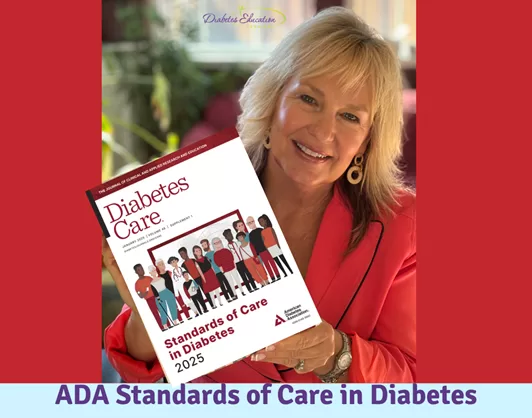
Ready to get certified?
Free CDCES Coach App

Subscribe
eNewsletter
Download
Free Med Pocket Cards
Question of the Week | Based on ADA Standards, what is next med addition?

JR has type 2 diabetes and takes Metformin 1000mg BID and sitagliptin (Januvia), A1C 8.1%. GFR 47, UACR 158mg/g. Recent diagnosis of congestive heart failure. These are the medications their insurance covers.
Of the following medications, which addition would most benefit JR?
- glipizide (Glucotrol)
- pioglitazone (Actos)
- semaglutide (Ozempic)
- dapagliflozin (Farxiga)
Ignite your passion & prepare for Diabetes Certification!
Join our Expert Team at our dynamic Virtual DiabetesEd Training Conference April 16-18th, 2025

Gain fresh insights, practical tools, and a deeper understanding of the latest in person-centered diabetes care. Our expert team brings the ADA Standards of Care to life—covering medications, behavior change, technology, and more! If you’re preparing for the CDCES or BC-ADM exam, this conference—paired with free bonus courses—serves as the ideal study companion!
With interactive co-teaching, we keep sessions engaging, relevant, and fun. Let’s learn and grow together!

Our expert team transforms complex diabetes science into clear, practical insights—keeping it real, engaging, and fun! The faculty includes:
- Diana Isaacs, PharmD, BCPS, BC-ADM, BCACP, CDCES
- Coach Beverly Thomassian, RN, MPH, CDCES, BC-ADM
- Christine Craig, MS, RD, CDCES
- 3 Days: of critical information delivered by passionate speakers in an engaging and fun format!
- 11 Bonus Online Courses: As a course attendee, you automatically receive a bonus online course bundle of 11 online courses valued at over
Question of the Week | What happens when people stop taking GLP /GIPs?

About 30% of people with diabetes started on GLP-1’s stop taking this medication before completing a year of therapy.
According to ADA Standards, what results from sudden discontinuation of GLP-1s /GIP like semaglutide and tirzepatide?
- People maintain their weight loss for at least a year.
- People regain at least one-half of their weight loss within a year.
- People experience decreased nausea and less than 10% weight regain.
- People continue behaviors learned on medication with ongoing weight loss success.
Ignite your passion & prepare for Diabetes Certification!
Join our Expert Team at our dynamic Virtual DiabetesEd Training Conference April 16-18th, 2025

Gain fresh insights, practical tools, and a deeper understanding of the latest in person-centered diabetes care. Our expert team brings the ADA Standards of Care to life—covering medications, behavior change, technology, and more! If you’re preparing for the CDCES or BC-ADM exam, this conference—paired with free bonus courses—serves as the ideal study companion!
With interactive co-teaching, we keep sessions engaging, relevant, and fun. Let’s learn and grow together!

Our expert team transforms complex diabetes science into clear, practical insights—keeping it real, engaging, and fun! The faculty includes:
- Diana Isaacs, PharmD, BCPS, BC-ADM, BCACP, CDCES
- Coach Beverly Thomassian, RN, MPH, CDCES, BC-ADM
- Christine Craig, MS, RD, CDCES
- 3 Days: of critical information delivered by passionate speakers in an engaging and fun format!
- 11 Bonus Online Courses: As a course attendee, you automatically receive a bonus online course bundle of 11 online courses valued at over
Question of the Week | 2025 ADA Standards: Key Nutrition Behaviors for Individuals with Diabetes

According to the 2025 ADA Standards of Care, which of the following nutrition behaviors are strongly encouraged for individuals with diabetes?
- Incorporate onions, garlic, celery, carrots and other vegetables for a base of homemade
foods. - Use herbs and spices to season foods instead of salt containing preparations.
- Water should be the primary beverage of choice.
- Include family or roommate in meal preparation.
- All of the above.
Ignite your passion & prepare for Diabetes Certification!
Join our Expert Team at our dynamic Virtual DiabetesEd Training Conference April 16-18th, 2025

Gain fresh insights, practical tools, and a deeper understanding of the latest in person-centered diabetes care. Our expert team brings the ADA Standards of Care to life—covering medications, behavior change, technology, and more! If you’re preparing for the CDCES or BC-ADM exam, this conference—paired with free bonus courses—serves as the ideal study companion!
With interactive co-teaching, we keep sessions engaging, relevant, and fun. Let’s learn and grow together!

Our expert team transforms complex diabetes science into clear, practical insights—keeping it real, engaging, and fun! The faculty includes:
- Diana Isaacs, PharmD, BCPS, BC-ADM, BCACP, CDCES
- Coach Beverly Thomassian, RN, MPH, CDCES, BC-ADM
- Christine Craig, MS, RD, CDCES
- 3 Days: of critical information delivered by passionate speakers in an engaging and fun format!
- 11 Bonus Online Courses: As a course attendee, you automatically receive a bonus online course bundle of 11 online courses valued at over
Question of the Week | Action needed to prevent heart failure?

Adults with diabetes are at increased risk for the development of asymptomatic or symptomatic heart failure.
According to the ADA 2025 Standards of care, what action is needed to facilitate prevention of heart failure?
- Recommend the DASH Diet.
- Measure natriuretic peptide (BNP or pro-BNP).
- Assess ankle circumference at each visit.
- Recommend echocardiography after age 55.
Want to learn more about this question?
Join us live on starting Feb. 6th- March 5th, 2025 for our
Level 3
Diabetes Mastery & Cert Readiness

Ready for your certification exams? Our Level 3 course series is the final step in your exam prep, complementing our Level 1, 2, or 4 bundles. Designed for healthcare professionals preparing for diabetes certification exams in 3-6 months, this master-level series covers key topics like pharmacology, technology, MNT, and person-centered care, all based on the latest ADA Standards of Care.
Each course includes a video, podcast, practice test, and additional resources—available immediately for one full year. Boost your knowledge and confidence to succeed in your certification!
Question of the Week | ADA 2025: Intensive Prevention for High-Risk Individuals with BMI >35 kg/m2

According to ADA 2025 Standards, more intensive preventive approaches should be considered in individuals who are at particularly high risk of progression to diabetes, including individuals with BMI ≥35 kg/m2 who:
- Sit more than eight hours a day and have a sedentary lifestyle.
- Have a history of thyroid or celiac disease.
- Consume a diet with high amounts of simple carbohydrates.
- Have fasting plasma glucose of 110–125 or A1C ≥6.0%.
Want to learn more about this question?
Enroll in our Standards of Care Course
This is our most popular course of the year, offering the perfect opportunity to immerse yourself in the essential content featured in this comprehensive 300-page clinical guidebook.
“As always, Bev delivers comprehensive human-centered material to make me a better educator and leader.“- DiabetesEd Student
We hope to see you there!

Question of the Week | What defines overbasalization according to 2025 ADA Standards?

According to the new 2025 ADA Standards of Care, which of the following most accurately reflects overbasalization?
- basal insulin doses exceeding 0.5 units/kg/day
- significant bedtime-to-morning or postprandial-to-preprandial glucose differential
- low glycemic variability
- basal insulin dose exceeding 50 units twice per day
Want to learn more about this question?
Enroll in our Diabetes Mastery & Cert Readiness

Ready to ace your diabetes certification exams? Our Level 3 courses are the ultimate step in your exam prep journey, designed to fill in any knowledge gaps and solidify your expertise. Whether you’re preparing for the CDCES or BC-ADM exams, these master-level courses offer comprehensive, evidence-based content grounded in the latest ADA Standards of Care in Diabetes.
Dive into critical areas like pharmacology, technology, lifestyle management, and Medical Nutrition Therapy, all while building the practical and strategic skills you need to deliver top-notch care. With video presentations, podcasts, practice tests, and engaging case studies, you’ll gain the confidence and competence to navigate complex diabetes scenarios. Plus, enjoy access to your course materials for a full year! Sign up now and set yourself up for certification success!
Question of the Week | ADA Standards identify another 1st Line med to treat kidney disease. Which one?

According to the ADA 2025 Standards, new clinical trials suggest that another diabetes medication (besides SGLT-2i) can be used as a first line agent to treat chronic kidney disease.
Which of the folowing diabetes meds is effective as a first-line agent for people with CKD?
- Afrezza inhaled insulin
- Semaglutize (Ozempic)
- Amylin (Pramlintide)
- Sitagliptin (Januvia)
Want to learn more about this question?
Join us live on January 30th @ 11:30am PST for our
Level 2 | Standards of Care Course
This course, updated annually, is an essential review for anyone in the field of diabetes. Join Coach Beverly as she summarizes the annual updates to the American Diabetes Association’s (ADA) Standard of Medical Care in Diabetes & provides critical teaching points & content for healthcare professionals involved in diabetes care & education.
All hours earned count toward your CDCES Accreditation Information
Sign up for Diabetes Blog Bytes – we post weekly Blog Bytes that are informative and FREE! Every week we post one exam practice Question of the Week and Rationale of the Week. Sign up below!
Recent Blog Bytes
- Rationale of the Week | What Does J.C.’s Family History & Lab Work Reveal?
- Red Flags for Low Digital Literacy in Diabetes Care
- Question of the Week | Best Response for Facilitating Positive Health Behavior Change?
- Rationale of the Week | What to Assess When Looking for PAD?
- Grief and the Role of the Diabetes Educator
The use of DES products does not guarantee the successful passage of the certification exam. CBDCE and ADCES do not endorse any preparatory or review materials for the CDCES or BC-ADM exams, except for those published by CBDCE & ADCES.
Question of the Week | Diabetes and Malnutrition Risk

The 2025 ADA Standards of Care have added recommendations for malnutrition screening.
According to these updated standards, who could be at risk for malnutrition?
- An individual with a BMI of 38 and 21% weight loss in the past 6 months.
- An individual on incretin therapy with intentional 18-pound weight loss in the past 2 months.
- An 86-year-old with type 1 diabetes and reported recent decline in activity and strength.
- All the above
Want to learn more about this question?
Join us live on Jan. 30th for our
2025 Standards of Care
Level 2

This course, updated annually, is an essential review for anyone in the field of diabetes. Join Coach Beverly as she summarizes the annual updates to the American Diabetes Association’s (ADA) Standard of Medical Care in Diabetes & provides critical teaching points & content for healthcare professionals involved in diabetes care & education.
All hours earned count toward your CDCES Accreditation Information
Sign up for Diabetes Blog Bytes – we post weekly Blog Bytes that are informative and FREE! Every week we post one exam practice Question of the Week and Rationale of the Week. Sign up below!
Recent Blog Bytes
- Rationale of the Week | What Does J.C.’s Family History & Lab Work Reveal?
- Red Flags for Low Digital Literacy in Diabetes Care
- Question of the Week | Best Response for Facilitating Positive Health Behavior Change?
- Rationale of the Week | What to Assess When Looking for PAD?
- Grief and the Role of the Diabetes Educator
The use of DES products does not guarantee the successful passage of the certification exam. CBDCE and ADCES do not endorse any preparatory or review materials for the CDCES or BC-ADM exams, except for those published by CBDCE & ADCES.







